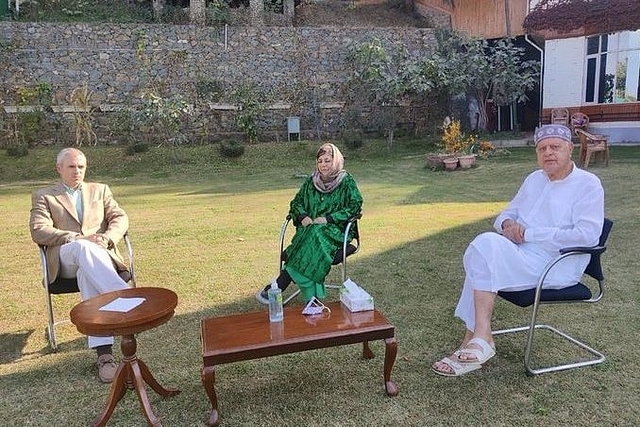
Time To End Gupkar Delusion: Kashmiri Statehood Is Fine, But Jammu Must Be Hived Off First
The Gupkar Declaration essentially calls for the restoration of status quo ante, which is exactly what should not happen.
There can be no return to the situation before 5 August 2019. Rather, we have to move forward from there, and not backward.
The so-called Gupkar Declaration, which brings together the largely Muslim-backed regional and national parties in Jammu & Kashmir to demand the restoration of the state’s “special status”, needs to be debunked comprehensively.
There can be no special status to a state that ethnically cleansed an entire people out of the valley, denied Jammu and Ladakh regions their dues, kept thousands of Dalits and women disempowered in the name of protecting the state’s demography, and generally kept the Constitution of India from being applied to the state.
Among the demands, the only one that makes sense – and is non-sectarian – is the restoration of statehood, but this is where India needs to complete the job it began on 5 August 2019 with the nullification of article 370 and the splitting of the state into two Union territories, Jammu & Kashmir and Ladakh.
While the Union Territory status of Ladakh cannot be changed in view of its strategic importance on the China border, the unfinished business of nullifying article 370 is that it still keeps Jammu beholden to Kashmiri interests. Hindu-majority Jammu is as deserving of separate statehood as Buddhist-Shia Ladakh.
The Gupkar Declaration, based on the name of the road where Farooq Abdullah has his residence, essentially calls for the restoration of status quo ante, which is exactly what should not happen. Having run the state into the ground, and allowed separatist and Islamists to create mayhem, there can be no return to the situation before 5 August 2019. Rather, we have to move forward from there, and not backward. This implies three things:
One, Jammu must be given full statehood along with Kashmir Valley. This way, the Hindu majority character of the new state can be safeguarded by politicians with Jammu’s interests at heart.
As long as Kashmiri politicians got to rule Jammu, they were busy trying to change the demographic character of this region, including by allowing the Rohingyas to settle there. It is worth recalling that one of the friction points between the Bharatiya Janata Party and its erstwhile coalition partner, Mehbooba Mufti’s Peoples Democratic Party, was the settlement of Rohingyas and Bangladeshi refugees in Jammu, thus creating the potential for a future demographic shift against Hindus.
Two, the Pandits who were forced to flee Kashmir Valley by Islamists must be compulsorily resettled there, if needed by the creation of enclaves that can be protected by the police.
If, at some point, the Hindus feel safe enough in Muslim-majority Kashmir Valley after due apologies and compensation from the locals, these settlements can be dismantled, even though strong protection forces must always be available.
Three, and this need not be stated upfront, with adequate safeguards to protect local identities, Indians from other parts of the country must be allowed by buy land and settle in Jammu or Kashmir. Indians cannot be artificially walled away from regions where the majority community is not Hindu – whether it is Kashmir, Nagaland, Mizoram, or any other state in the North East.
The government must keep two plans ready: one is to make the above legislative changes after the Supreme Court hears and gives its verdict on the challenges to the 5 August decision to nullify article 370; the other must be to prepare to take counter-measures if the court verdict goes against Parliament’s decision in any way. The courts must not be allowed to take away Parliament’s right to rework state boundaries, when required.
It is a pity that the Gupkar votaries include not only the National Conference and PDP, but also the Congress party and the communists. Though the Congress party did not attend Thursday’s meeting at Gupkar Road, it expressed support for its goals.
The Communist Party of India-Marxist’s anti-national strains are well known – to this day it has not denounced Chinese aggression in Ladakh – but for the Congress to support this kind of separatist cabal is unforgivable. They will lose whatever support they now have in Jammu.